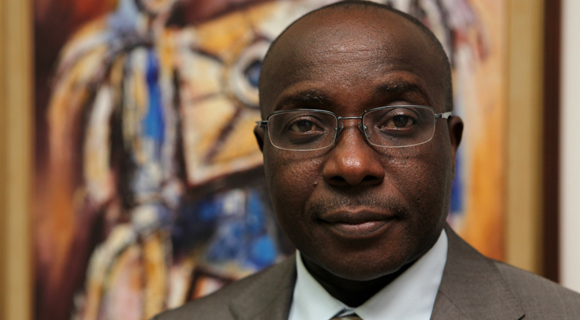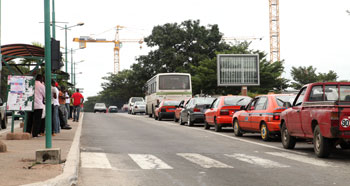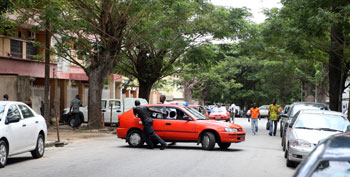Invest in Roads Network in Côte d’Ivoire
Bouaké Fofana, General Director of Ageroute (Ministère des Infrastructures Economiques)
Ageroute is charged with the management and support of road projects in Côte d’Ivoire. The current infrastructure, especially the road network, in Côte d’Ivoire is in a bad shape as there were no new roads built in the past 10-15 years. The planned rehabilitation of thousands of kilometers of roads in Côte d’Ivoire should create 5,000 permanent jobs in the next 5 years.
Interview with Bouaké Fofana, General Director of Ageroute (Ministère des Infrastructures Economiques)

The lack of investments and mal-investments in the last 10 years, coupled with the post-electoral crisis, have impaired the Ivorian infrastructure and road network. How would one assess the current state of the road networks and infrastructure in Côte d’Ivoire?
The road network is currently in really bad shape; with respect to the development of the network, the country has not built a single new road in the past 10 to 15 years. In regards to the existing network, Côte d’Ivoire has not done a better job maintaining its roads, due mainly to insufficient budget allocation. As a result, the service level is very low on the country’s roads. Only a large and vigorous program can save the national road network. This program must start no later than 2012. Otherwise, Côte d’Ivoire may lose a significant portion of its paved roads.

Indeed, the country needs to rebuild the whole network. Paved roads are designed for a lifetime of 15 to 20 years under normal maintenance conditions. In other words, this optimal lifetime will occur only if the normal routine and periodic maintenance operations are consistently carried out. In reality, lack of funding means that virtually no maintenance operations were carried out over the past 10 to 15 years.
How many kilometers does Côte d’Ivoire need?
Right now, Côte d’Ivoire has 6,500 paved roads and around 75,000 dirt and feeder roads; that translates to about 82,000 kilometers of roads. Côte d’Ivoire needs to save and maintain the existing asset. Of course, the country needs additional roads to optimize the network or to pave some major feeder or dirt roads. But from a strategic standpoint, Côte d’Ivoire must put the focus on rehabilitating existing roads.
The government has assembled a very ambitious program. Starting from the second half of 2012, the goal is to strengthen and rehabilitate at least 1,000 km of paved roads and 5,000 km of dirt roads per year over the next five years.
Côte d’Ivoire also needs a number of big bridges, both in Abidjan and in the country. As is commonly known, the construction of the third bridge of Abidjan finally started last September. The contractor is Bouygues. It’s a BOOT contract. The existing two bridges of Abidjan are to be rehabilitated in 2012 and 2013.
It takes a full day to drive the 300 km road between Abidjan and San Pedro. We need to improve this; such a trip should last 3 hours.
How much direct and indirect employment should be created by this ambitious investment plan?
Public works is a labor-intensive sector; around 5,000 permanent jobs will be created in the next five years. The program may generate about 200,000-300,000 temporary jobs as well.
Is the road network sufficient for the needs of international investors? Most investors look at security and infrastructure when investing.
The length of the existing network seems sufficient to support the needs of the businesses if the level of service is upgraded. Sure, additional roads may further improve the service level. As mentioned earlier, the priority is to restore the service level on the existing network. The next step is optimizing the network with a few economically justified additions. For example, it takes a full day to drive the 300 kilometers between Abidjan and San Pedro, the second port. It should be a 3-hour trip, but it takes a full day and the same situation occurs almost everywhere. The priority will be placed on changing this situation, which is now a huge liability for businesses and for people.
How will the question of financing be approached?
The government has identified various sources of funding for the program:
First, a large portion of the funds expected from the debt release program will be devoted to the road sector.
Second, the government will make a special effort to increase both its direct budget allocation and the road fund.
A third significant source of funding will be the private sector through private/public partnerships.
Ageroute expects additional funding from multilateral and bilateral institutions, especially for new constructions and periodic maintenance operations.

Finally, the government will improve its procedures in order to increase disbursements. In total, a significant increase in funding and improved administrative procedures will help achieve program’s ambitious goals.
How much space will there be for international investors in this project and are private/public partnerships being considered?
There is no way that Ageroute can achieve the goal of rehabilitating the whole road network within the next 5-10 years if the country is unable to bring in international contractors and engineering firms. The country needs to attract big contractors from everywhere in the world and this ability will be the key success factor. Ageroute may have all the funding it needs, but without international players in the field, the country will not be able to achieve the goal. Ageroute has received many inquiries from groups of investors and contractors. Major players from Europe, the Middle East, China, and the Gulf have already expressed interest. Ageroute will also widely publicize the five-year program to attract many more contractors and engineering firms.
Côte d’Ivoire will definitely need the private sector’s participation and contribution. Ageroute is open to all kinds of partnerships.
What are the guarantees now that international investors are offered a tendering process that will be transparent?
As aforementioned, most of the funding will come from international agencies. Therefore, those funding agencies will closely supervise the whole procurement process. Ageroute’s local procurement policy and procedures fully comply with international requirements and guidelines.
Ageroute can assure all contractors that the tendering process will be transparent; furthermore, the government has set up an independent regulatory body, a kind of watchdog for all public procurements and tenders.Any supplier can file a complaint before that body. This policy gives more security to contractors and suppliers.